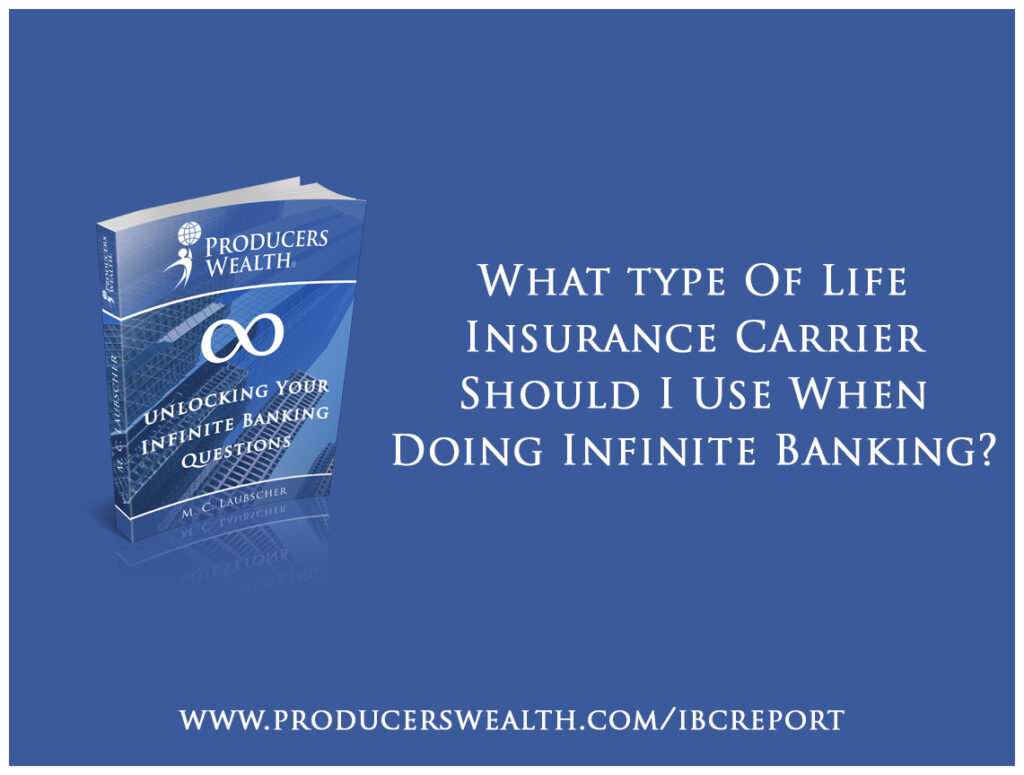
The Infinite Banking Concept strategy is implemented and executed using a dividend paying whole life insurance policy with a mutual life insurance company.
A mutual insurance company is an insurance company owned by its policyholders, rather than shareholders. Profits generated by a mutual insurance company are typically distributed to policyholders in the form of dividends or used to reduce future premiums, improve coverage, or strengthen the company’s financial position. Mutual insurance companies operate with a focus on the long-term interests of their policyholders and prioritize financial stability, policyholder satisfaction, and providing quality insurance products.
In contrast, a stock life insurance company is owned by shareholders who invest in the company by purchasing shares of its stock. Stock life insurance companies aim to generate profits for their shareholders and are subject to the pressures of the stock market, which often emphasizes short-term financial performance. As a result, stock life insurance companies may prioritize shareholder returns over policyholder interests.
Differences Between A Stock & Mutual Life Insurance Carrier
The key differences between a mutual life insurance company and a stock life insurance company can be summarized as follows:
Ownership: Mutual life insurance companies are owned by policyholders, while stock life insurance companies are owned by shareholders.
Profit distribution: In a mutual life insurance company, profits are typically distributed to policyholders in the form of dividends or used to improve the company’s products and financial position. In a stock life insurance company, profits are generally distributed to shareholders in the form of dividends or reinvested to increase share value.
Decision-making: In a mutual life insurance company, decisions are made with the long-term interests of policyholders in mind. In a stock life insurance company, decisions are often influenced by the need to maximize shareholder value and meet short-term financial performance goals.
Focus: Mutual life insurance companies tend to focus on policyholder satisfaction, financial stability, and providing quality insurance products. Stock life insurance companies may prioritize shareholder returns, which could sometimes conflict with policyholder interests.
When choosing a life insurance company for Infinite Banking or any other purpose, it’s essential to consider these differences and evaluate which type of company aligns best with your financial goals and needs. A mutual life insurance company may be more suitable for those seeking a long-term financial partner with a focus on policyholder interests, while a stock life insurance company may be more appealing to those interested in potentially higher returns and investment opportunities.
How Mutual Life Insurance Carriers Aligns Its interest With policy Holders
In a mutual life insurance company, policyholders are essentially part-owners of the company. This means that the interests of policyholders are more closely aligned with the company’s interests compared to policyholders in a stock life insurance company, where the primary responsibility is to shareholders.
Here’s how the interests of policyholders align with mutual life insurance carriers:
Ownership structure: In a mutual life insurance company, there are no outside shareholders. Policyholders have an ownership stake in the company, and the company operates with the primary goal of serving the best interests of its policyholders. This contrasts with stock life insurance companies, where the focus is on maximizing shareholder value, which may not always align with the best interests of policyholders.
Profit distribution: Mutual life insurance companies distribute their profits to policyholders in the form of dividends or reduced premiums, depending on the specific company and policy terms. This means that policyholders directly benefit from the company’s financial success, whereas in a stock life insurance company, profits are primarily distributed to shareholders in the form of dividends.
Long-term focus: Mutual life insurance companies generally adopt a long-term approach to managing their investments and operations, as their primary responsibility is to meet the future claims and obligations of their policyholders. This long-term focus can lead to more stable and secure financial performance, ensuring that policyholders’ interests are protected over time.
Policyholder influence: As part-owners of the company, policyholders in a mutual life insurance company may have the right to vote on important company matters, such as the election of the board of directors. This gives policyholders a voice in the company’s governance and ensures that their interests are taken into account in the decision-making process.
Financial strength and stability: Since mutual life insurance companies are focused on serving their policyholders, they are generally more conservative in their investments and financial management. This approach contributes to the financial strength and stability of the company, providing policyholders with greater confidence that their claims will be paid and their policies will be honored.
How To Choose Your Mutual Insurance Life Insurance Carrier
Choosing the best mutual life insurance carrier for an Infinite Banking policy requires careful consideration of various factors to ensure that the company and policy align with your financial goals and needs.
Here are some steps to help you choose the right mutual life insurance carrier:
Financial strength: A strong financial foundation is crucial when choosing a life insurance carrier. Look for companies with high financial strength ratings from independent rating agencies such as A.M. Best, Standard & Poor’s, Moody’s, or Fitch. These ratings indicate the insurer’s ability to meet its financial obligations, including paying out policy loans and death benefits.
Dividend history: Since dividends can enhance the cash value growth of your policy, review the company’s track record of paying dividends. A consistent dividend payment history is a positive sign, although it’s important to remember that dividends are not guaranteed.
Policy options and flexibility: Examine the various whole life insurance policies offered by the company and evaluate the flexibility they provide in terms of premium payments, cash value growth, and policy loans. Look for policies with features that support your Infinite Banking goals, such as strong cash value accumulation and competitive policy loan interest rates.
Reputation and customer satisfaction: Research the company’s reputation and customer satisfaction levels. Look for reviews and testimonials from policyholders, as well as any industry awards or recognitions the company may have received. Consider reaching out to financial professionals or individuals experienced with Infinite Banking to get their opinions on the best carriers.
Customer service and support: Choose a company that offers excellent customer service and support, as you may need assistance in managing your Infinite Banking policy over time. Assess the company’s responsiveness, accessibility, and willingness to help with your questions and concerns.
Agent expertise: Work with a knowledgeable and experienced insurance agent or financial professional who is familiar with Infinite Banking and can guide you through the process of selecting the right policy and carrier. They can help tailor the policy to your needs and ensure you understand the policy features and benefits.
By taking these steps and carefully evaluating your options, you can choose the best mutual life insurance carrier for your Infinite Banking policy.
Remember that the right carrier will depend on your individual financial goals, needs, and circumstances, so take the time to thoroughly research and compare carriers before making a decision.
Watch all of our educational videos on Infinite Banking here.
Disclaimer and Waiver
Michiel Laubscher & Laubscher Wealth Management LLC is not an investment advisor and is not licensed to sell securities. None of the information provided is intended as investment, tax, accounting, or legal advice, as an offer or solicitation of an offer to buy or sell, or as an endorsement, of any company, security, fund, or other offerings. The information should not be relied upon for purposes of transacting securities or other investments. Your use of the information contained herein is at your own risk. The content is provided ‘as is’ and without warranties, either expressed or implied. Michiel Laubscher & Laubscher Wealth Management LLC does not promise or guarantee any income or specific result from using the information contained herein and is not liable for any loss or damage caused by your reliance on the information contained herein. Always seek the advice of professionals, as appropriate, regarding the evaluation of any specific information, opinion, or other content.





